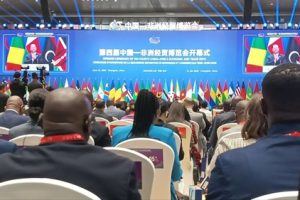
BY ABEBE WOLDEGIORGIS
The second most populous country in Africa next to Nigeria with more than 120 million inhabitants, Ethiopia, its economy is mainly relied on agriculture characterized by rain fed, less utilizing input which in turn with less output. The sector supplies inputs to the manufacturing industry, to domestic market and is a source of foreign currency earnings. Though striving to become a middle income country scoring promising progress, its economic status put it among the poor nations.
To reverse this ugly situation, the government exerts efforts by formulating appropriate policies, to reduce poverty and to raise productivity.
For its development endeavors, it allocated huge budget obtained from local and foreign sources. But as to reports, the rampant budget mismanagement, corruption and resource misallocation crippled the all development efforts.
The Office of Federal Auditor General (OFAG) is working under the auspicious of the House of Peoples Representatives and reports its audit findings to legislatives. Meseret Damte, Auditor General of the Office, recently presented her office’s first half performance report of the current fiscal year to the parliament.
As to her, the OFAG’s activity is based on international principles. There is nothing that changes at the office, whether she or another person becomes the director general. The task of any OFAG director is to strengthen and maintain those existing principles.
OFAG’s mandate is derived from the constitution, and there are also several international declarations. These laws are necessary to avoid alterations to national auditing principles whenever there is a regime change.
In the past, the office used the Regulatory Audit Manual and this year, it launched the Financial Audit Manual that includes the compliance and financial aspects of the audit and disseminated to all regional states.
In order to upgrade the knowledge and skill of the staffs regarding the profession, the office launched a master’s degree program for auditors in cooperation with the Addis Ababa University (AAU). Currently, the office is auditing the budget expenditures of the last fiscal year, and they will be made public soon.
She further said that in the past, there were many public projects requiring up to 200 percent price adjustments due to delay. Project performance in Ethiopia used to be very poor and substandard, but projects managed by the PM have changed this history and are finalized on time.
The office prepared to conduct an audit if there is evidence that public projects are being delayed and to that end evidence is needed more than hearsay. The office of the auditor general obtained all budget documents, especially loan and aid documents, from the Ministry of Planning and Development before conducting the audit. Then it prioritizes the issues and launches findings of the audit.
As to her, the office audits all federal institutions. There are 175 federal institutions, and this year, 15 are being audited by the Audit Service Corporation. The OFAG is auditing the rest. It conducts financial audits, performance audits, and special audits. The IT audit is also mentioned in the audit proclamation, which is currently in the pilot project stage and it will be continued fully in the future.
Nevertheless, in the 2019-20 OFAG report, the audit report of 39 institutions was not accepted by them. Therefore, the Ministry of Finance and other respective regulators have taken the necessary measures against those institutions that failed to be governed by the audit principles.
This year, the office managed to return over 4.1 billion Birr to the government which was spent illicitly. There are a lot of public financial mismanagement cases that the office has forwarded to the Ministry of Justice for further investigations. Cases involving several institutions are currently under the legal process. Even though the degree varies, most public institutions are accepting and implementing the recommendations.
Asked whether her office is auditing the regional states or not, she said that basically, her office did not audit regional states earlier since the regional states have their own auditing jurisdictions. But a new proclamation has been introduced that enables the OFAG to interfere with them.
As a result, this year, the office is attempting for the first time to include all twelve regional states in the federal auditing system and trying to implement a uniform audit format across the country. To this end, it sent OFAG auditors to train regional states’ auditors.
This system is called the Single Audit Act. The office is working with the US Center of Excellence to adopt this system. As a result, their experts will arrive in the coming months to train OFAG staff as well as members of the parliament’s government expenditure standing committee.
Because of the Act, OFAG can make sure that all government institutions, both in the federal and regional states, are accountable. Previously, when the federal government allocated budgets to regional states, they became subject to regional states’ jurisdiction, and the regional states had full autonomy over their internal audit. So, based on the Single Audit Act, the office introduced a new proclamation that enabled it to create a similar audit format. Currently, the office is building the capacity of all regional states based on OFAG principles.
As to Meseret, from now on, regional states’ auditors will audit based on OFAG formats and principles. This will avoid duplication of efforts. If the OFAG conducted its own auditing across the country, it would have needed 10,000 auditors. But now it can rely on regional states’ auditors and make it part of OFAG’s reports.
Once the regional states adopt similar auditing formats and principles, it will be easy to the office to integrate and it planned to send mentors and regularly check that the quality of the auditing is intact.
The single audit system proved successful in the US. The US has a federal structure, and the system can be successful in Ethiopia too.
For the current fiscal year, four regional states have become part of the federal auditing system. Oromia, Addis Ababa, Sidama, and the southern regions have now become part of OFAG’s auditing system. Next, all regional states will be integrated into the system.
Donors especially want the office to audit the utilization of their funds on the ground. This is reported every three months, but it usually does not comment on it. So, one of the biggest changes is that the office is including regional states in the federal auditing system.
Most of the institutions under investigation and facing challenges are universities. Measures are also being taken against state-owned enterprises based on the office recommendations.
Meseret further said that Ethiopia uses the Westminster auditing model. This means that the auditing institution must present its findings to the legislature. Then the jurisdiction system takes legal action. Countries that have a parliamentary system, basically adopt the Westminster way.
In the court-system auditing model, the auditing institution can also take legal action. There is also a board system. Different institutions represent the board.
Since Ethiopia has a parliamentary system, the OFAG can only report its findings to the Parliament. But whenever the office find out about any wrongdoing, it directly presents the evidence to the attorney general. It also works with the Anti-Corruption Commission.
The model is determined by the type of political structure a country adopts. Only the Westminster system is possible in a parliamentarian country. The court system model is adopted by countries that have a presidential system.
If Ethiopia’s constitution is changed and shifted to a presidential system, then it might be possible to change the audit system to a court system.
The implications for the economy are very serious. The value of one Birr is changing fast. This is causing project costs to increase substantially every time the project is delayed. On the other hand, the country is not getting the return of that project because it has not been finalized on time.
The public is also not benefiting from the project. The additional cost of some projects can finance new projects.
As to Meseret, she has been at the OFAG for the past six years. It presents its findings to the Parliament before the officials from the audited institutions come to Parliament to take comments. This trend did not change.
For instance, open criticism had been conducted at 26 institutions last year. The office never hesitates to expose wrongdoing. The parliament is the primary venue for reporting and criticizing executive wrongdoing. That is crucial platform. To make the findings public, it collaborates with the parliament’s government expenditure standing committee, but it cannot go beyond its auditing scope.
Most of the corruption tricks and schemes in Ethiopia are not document-based. They are difficult to detect and find evidence since they are done without documentation. It is difficult to discover via auditing. They are systematic, but the office indicates such issues in its report.
If the government had taken serious action on OFAG recommendations from the beginning, the current problem could have been avoided. The office has been giving recommendations on every mismanaged project in the country.
For example, billions were squandered on MeTEC now National Industrial Engineering Corporation. But because it was difficult to correct the wrongdoings of the past, they chose to leave them there. If the respective institutions had taken the right action at the right time, such a waste of public resources could have been avoided.
Unless the implementers take them seriously, audit findings have no meaning. Earlier, the Anti-Corruption Commission was not powerful and active. If the commission had been strong enough, it would have been no need for a new committee to combat corruption.
THE ETHIOPIAN HERALD WEDNESDAY 25 JANUARY 2023




